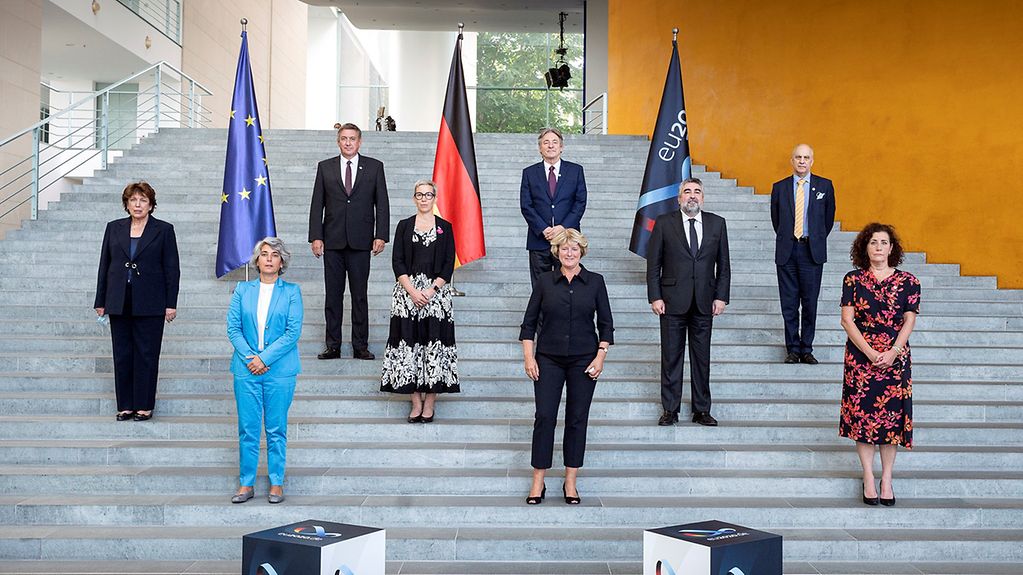EU ministers of culture meet in Berlin
The EU ministers of culture came together in Berlin for a meeting hosted by Federal Government Commissioner for Culture and the Media, Minister of State Monika Grütters. The working meeting primarily focused on how to deal with the impact of the COVID-19 pandemic on culture in EU member states. Another issue on the agenda was Europe’s common cultural heritage.
2 min reading time

Minister of State Monika Grütters has welcomed her European counterparts to a working meeting at the Federal Chancellery: 1st row (left to right): Graca Fonseca (Portugal), Monika Grütters, Ingrid van Engelshoven (Netherlands), (2nd row, left to right) Roselyne Bachelot-Narquin (France), Sam Tanson (Luxembourg), José Manuel Rodriguez Uribes (Spain) and (3rd row, left to right) Jan Jambon (Belgium), Vasko Simoniti (Slovenia) and Jaroslaw Pietras (Director-General for Transport, Energy, Environment and Education, in the General Secretariat of the Council of the European Union).
Photo: BKM / Guido Bergmann
In spite of the COVID-19 pandemic, many of Grütters’ European counterparts made their way to the Federal Chancellery in person. The main purpose of the meeting was to look at the challenges posed by the pandemic for the entire cultural sector across Europe.
Recovery assistance for the cultural sector called for
“We all agree that European recovery assistance must take appropriate account of the cultural and creative sector,” the Minister of State said. She went on to explain that the EU’s pandemic recovery assistance must also benefit artists, workers in the creative economy and cultural facilities, while EU assistance programmes ought to have a stronger cultural policy emphasis.
“What we also need are proportionate pandemic regulations to keep culture alive in Europe,” said the Minister of State. She emphasised that health considerations naturally must always take precedence, but that there are now examples demonstrating that it is possible to resume cultural activities even during the pandemic.
Europe’s heart beats in our culture, says Monika Grütters
Earlier, Monika Grütters pointed to the unifying power of our common European culture, saying: “Europe’s heart beats in our culture”. She is convinced that if we can now manage to re-mobilise the force of the creative sector and our common cultural heritage, the COVID-19 pandemic could strengthen trust in the European Union and thus also in European solidarity and cohesion.
Together for Europe’s recovery. That is the motto of Germany’s Presidency of the Council of the European Union in 2020. At times of crisis, such as those we are experiencing as a result of the current COVID-19 pandemic, this is particularly true of cultural and media policy. Now, more than ever, we are seeing how important culture and the media are for the process of European integration. You can find more information about EU cultural and media policy during Germany’s Presidency of the Council of the European Union here.
National experiences and strategies
Later, the ministers of culture discussed their national experiences and successful strategies for resuming cultural activities.
In this context, Monika Grütters drew attention to the German rescue and recovery programme NEUSTART KULTUR, for which the German Government has provided one billion euros. It is expressly designed primarily to maintain infrastructure in order to guarantee jobs and thus income for artists and all those working in the creative sector.
Visit to the Humboldt Forum
Exchange and diversity were also central themes of the cultural programme that followed. On the agenda was a visit to the Humboldt Forum, which is due to open in December. During a guided tour, the ministers were able to learn more about the concept of the Forum, which is currently the most important national cultural project.